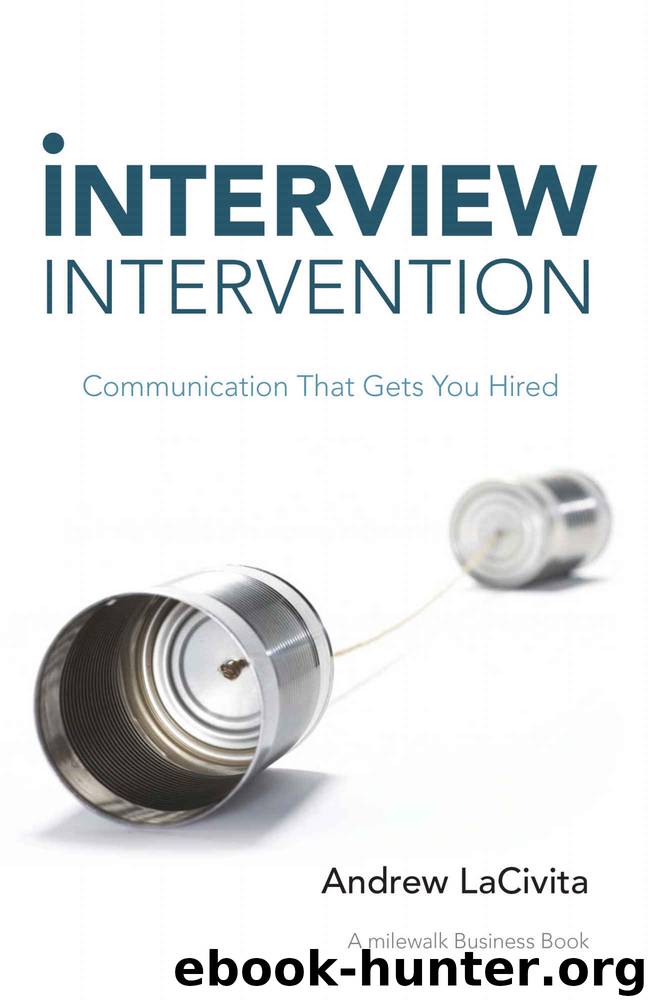Interview Intervention: Communication That Gets You Hired: a Milewalk Business Book by Andrew LaCivita

Author:Andrew LaCivita [LaCivita, Andrew]
Language: eng
Format: mobi
ISBN: 9781452547039
Publisher: Balboa Press
Published: 2012-03-15T04:00:00+00:00
Profit from Questioning—
Sell Twice, Buy Once
In an interview, waste no time doing anything that
doesn’t help sell you—not even when asking questions.
When preparing candidates for their interviews, I often ask them whether they have started planning questions. I also want to understand what they consider the main purpose of asking questions. The typical response is, “So I can gather information to make a good decision about whether this is a good company and place for me to work.” That, in part, is true. In my opinion, however, that only covers one third of your opportunity.
Bear in mind, when the interviewer asks, “Do you have any questions?” she has literally given you control of the interview. Why focus solely on gathering intelligence? You certainly don’t have to follow her script, at least for the time being. You now get to say and ask anything you want! Take it—own it.
If I can’t see it, it must not be true.
I’ll help maximize your benefit of asking questions a bit later in the chapter. First, I’d like you to think back to the interviewer’s perception, interpretation, and memory issues related to your remarks during the interview. Keep in mind that these issues are ever-present, so you will also need to account for them when preparing for and asking your questions. Most of what I have reviewed thus far related to those issues has been oriented toward verbal communication. That is only part of the equation. You must also account for interpretations drawn through your nonverbal actions. Never, during the entire interview, are you more susceptible to nonverbal miscues than when asking your questions.
I once had a senior-level information technology candidate interview with my client for a chief information officer position. He successfully navigated through several rounds of interviewing, and we were preparing for his final interview with the chief executive officer. The senior vice president of human resources explained that this was more of a formality than anything else. The CEO simply wanted to meet the candidate to ensure there were no glaring issues that the rest of the staff overlooked. (At this point, I was practically spending my recruitment fee on the new car I wanted. This would help me upgrade the model!) After the interview, the candidate called to inform me that it went well and he was excited about the opportunity. Great! The next day, the SVP of HR called to let me know they were passing on the candidate. He said that the CEO felt the candidate was unprepared for the interview. Specifically, he indicated the candidate was “winging it” when given the opportunity to ask questions. The candidate apparently had no notes or portfolio of documented questions. The candidate appeared to act as though he felt that this meeting was not important, and he seemed ill-prepared. I called the candidate to relay the feedback. When I asked the candidate whether this was true, he replied, “I had a few dozen questions prepared for the CEO. I asked him most of them and was able to obtain the information I needed.
Download
This site does not store any files on its server. We only index and link to content provided by other sites. Please contact the content providers to delete copyright contents if any and email us, we'll remove relevant links or contents immediately.
Nudge - Improving Decisions about Health, Wealth, and Happiness by Thaler Sunstein(7692)
Deep Work by Cal Newport(7063)
Principles: Life and Work by Ray Dalio(6421)
The Doodle Revolution by Sunni Brown(4753)
Factfulness: Ten Reasons We're Wrong About the World – and Why Things Are Better Than You Think by Hans Rosling(4731)
Eat That Frog! by Brian Tracy(4525)
Thinking in Bets by Annie Duke(4218)
Hyperfocus by Chris Bailey(4111)
Visual Intelligence by Amy E. Herman(3776)
Writing Your Dissertation in Fifteen Minutes a Day by Joan Bolker(3724)
Ogilvy on Advertising by David Ogilvy(3604)
Hidden Persuasion: 33 psychological influence techniques in advertising by Marc Andrews & Matthijs van Leeuwen & Rick van Baaren(3552)
How to Win Friends and Influence People in the Digital Age by Dale Carnegie & Associates(3547)
How to win friends and influence people by Dale Carnegie(3471)
The Pixar Touch by David A. Price(3431)
Schaum's Quick Guide to Writing Great Short Stories by Margaret Lucke(3374)
Deep Work: Rules for Focused Success in a Distracted World by Cal Newport(3225)
Work Clean by Dan Charnas(3116)
The Slow Fix: Solve Problems, Work Smarter, and Live Better In a World Addicted to Speed by Carl Honore(3007)
